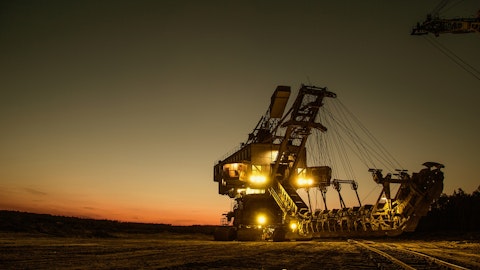Joel Jackson: Okay. And finally on the Salt mine operations. So you chose not to take any temporary layoffs at Cote Blanche in Louisiana. Talk about that decision, is because it may also inform how you’re going to play bid season. And what you’re going to pursue. But are you not downsizing temporarily production at Cote Blanche. And then at Goderich, is there a goal here to maybe, and I related sensitive topic to convert some of these temporary layoffs maybe to more permanent or to change shifts or to lower production over time as a runway based on Jeff’s prior question and also what we’re seeing at this year’s dynamic?
Edward Dowling: Right now the Cote Blanche we’re operating to meet our customer’s demand. I’ll just put it that way. But all options are on the table. And it’s something that we regularly review. At Goderich, we’re going to run at a lower rate probably through much of next winter to see where we stand at that point. And at which point, if we have a good winter, we hopefully could bring some of the people back into the workforce. But we don’t have any plans right now to make this a permanent layoff. This is a temporary layoff.
Joel Jackson: So Ed, I’ll ask one more question. I’m sorry, I’m being greedy here. So just to put us all together, wouldn’t that mean that in a fiscal 2025, in a normal winter scenario and Compass highway deicing salt volumes would be lower in a normal winter scenario than what you presented for this year? Your running Goderich, your biggest mine at lower volume. And the government customers are sitting with more inventory probably starting the year than they did the prior year. Isn’t it make sense that a normal run rate within Compass and fiscal 2025 would be lower highway deicing in a normal scenario than the fiscal 2024 numbers presented?
Edward Dowling: Just recall that we’re going to be – the Salt that we’re making this year gets sold next year for a large extent. And so much of the Salt going to our customers during what will be fiscal year 2024, 2025 is coming from inventory. That’s what we want to do to free up cash. So we’re going to keep Goderich at a lower rate until the inventory gets to a point where we think it should be at which in that point we’ll adjust the mine production quarterly. And I’ll also add, Joel, that the way that we’ve decided to manage the temporary layoffs in the production level at Goderich, it gives us flexibility in that regard and also minimizing our fixed costs during this period. Anyway, we’ve got it in such a way to do that, okay.
Joel Jackson: Thanks, Ed.
Operator: [Operator Instructions] And your next question is a follow-up from the line of David Silver with CL King. Please go ahead.
David Silver: Yes. Hi. Thank you. This question, I would like to direct to Gordon Dunn, if possible. But you’ve recently assumed greater responsibilities within Compass after spending a very long time running the UK operations and before that working for some very sophisticated industrial companies. The UK business has much smaller mines. It’s I think, more sensitive to import competition, et cetera. When you look at the North American assets and maybe try to apply your UK-based experience or your industrial experience before that. I mean, maybe if you could just comment on where you see the greatest opportunities. Are there some – is there some low hanging fruit that you can identify or best practices you could transfer? If you could just give us your assessment? It is early days, but your assessment at this point on what can be done or the extent of efficiency gains you think are possible? Thank you.
Gordon Dunn: Yes. Thank you for that, David. Yes, although I’ve been working in the UK for the last 10 years, I’ve been closely associated with Goderich for a long time and was briefly in-charge of Goderich as an interim basis. So I’m very familiar with the U.S. operation. Yes, I agree there is some – just jumping back, in the UK we’ve always worked our inventory in relation to what the weather has been because it’s extremely flexible and that’s the type of model that we’re introducing in the U.S. and Canada as well. So we’ll take the opportunity to flex the operation and match it in line with what the true demand is. I agree there are some low hanging fruits. I completely agree with you, continuous improvement is a big focus and that’s something that Ed and I have only been speaking about yesterday with how we get that up and running and introduce. So it becomes part of the culture of the organization.
David Silver: Thank you very much. Appreciate the comments.
Operator: With that, I’ll turn the call back to Ed for any closing remarks.
Edward Dowling: Thank you, again, for your interest in Compass Minerals. Please don’t hesitate to reach out to Brent if you have any follow-up questions. We look forward to speaking to you in the next quarter.
Operator: Everyone that will conclude our call for today. Thank you all for joining and you may now disconnect.
Follow Compass Minerals International Inc (NYSE:CMP)
Follow Compass Minerals International Inc (NYSE:CMP)
Receive real-time insider trading and news alerts



